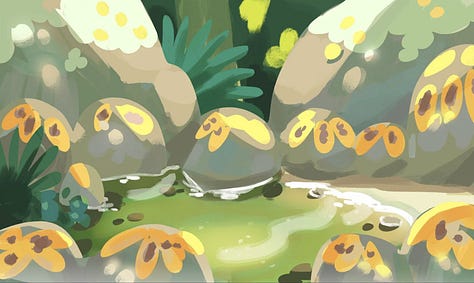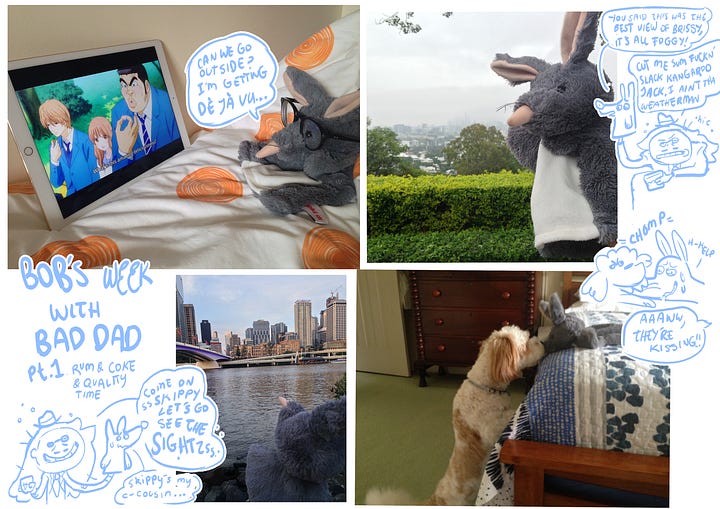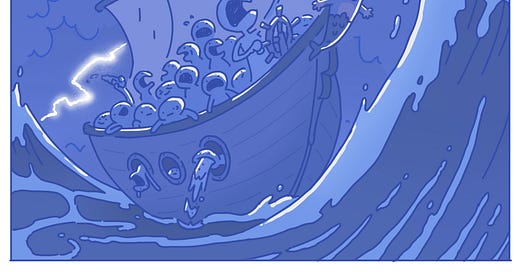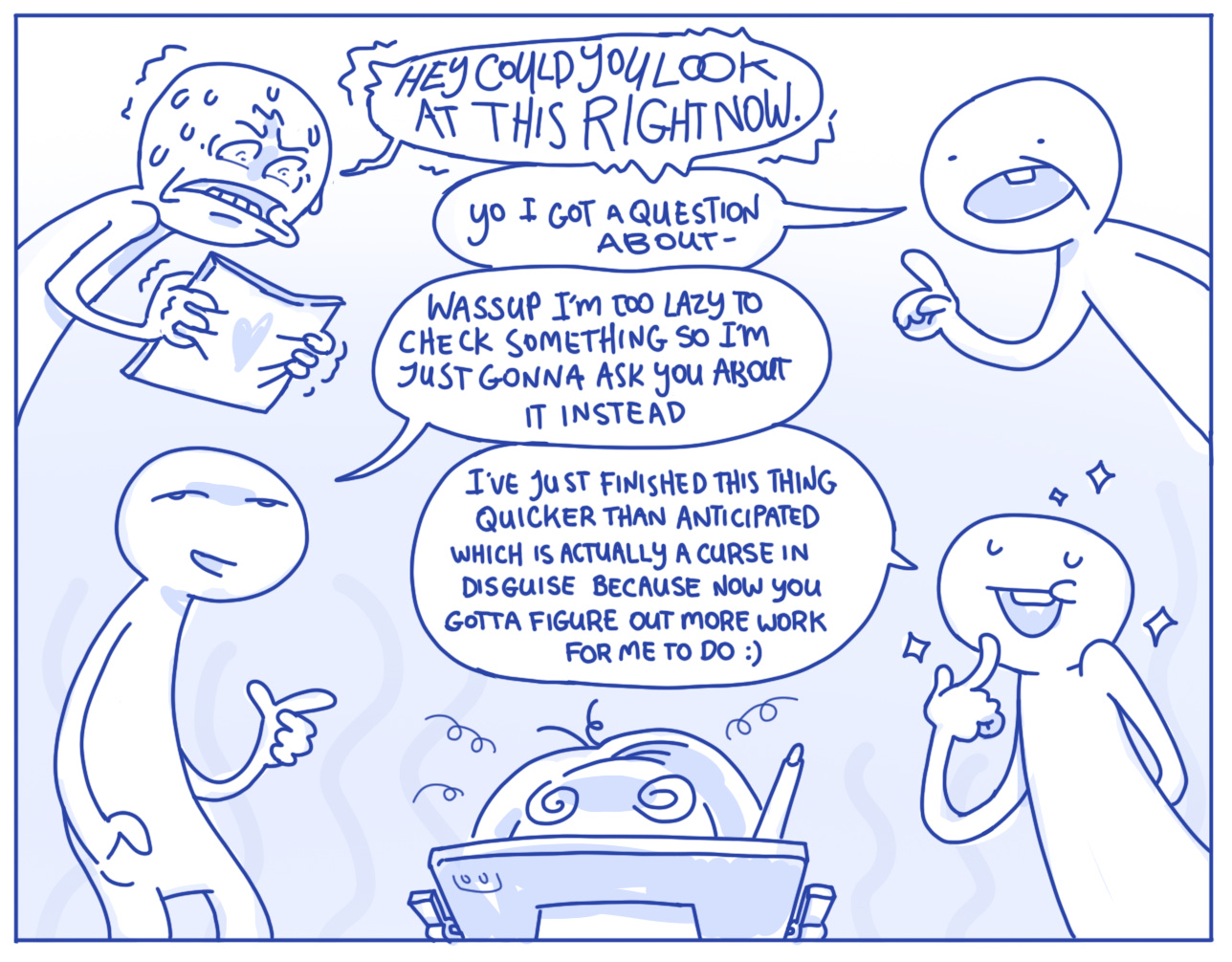Creating Bluey: Tales from the Art Director - Chapter 3
Blood, Sweat, Meat & Potatoes - What's it really like creating an animated show?
Now that the Bluey style and designs had been locked, it was time to start making the show. With Ludo production team we moved into a big office in the suburb of West End and it signalled the start of production. And oh, the giddy highs and stressful lows! The Friday beers! The unpaid overtime! We’ll be getting into it all.
But to get us all on the same page before we kick off - what exactly is an Art Director?
As someone who has worked under the moniker a few times across different studios and shows - I’ve grown to realise it’s a bit of an arbitrary title! Two different studios in the Animation industry could both have an ‘Art Director’, but they could be doing completely different things day to day. You could be drawing every day and doing really huge, sweeping visual development that affects the entire production. Other times you’re a spreadsheet monkey whose team is so big you’re doing all the ‘directing’ but not so much the ‘art’.
What makes matters more confusing, is that more than most other roles in the animation production pipeline, the Art Director’s day to day changes dramatically as the you move through the schedule.
Below is a very simplified stock standard role of an Art Director in a 2D Animated Television Pipeline.
The only key difference on Bluey was that we were a very small crew and a pretty simple style of show. Because of this, we essentially eliminated the pre-board design stage entirely. Instead of supervising our design departments, a lot of the work we did as Art Director’s was drawing all the background roughs, colour roughs, props, characters and VFX to hand off to the Design Departments and Rigging to be completed. Which meant it was a very hands on role!
Leading a Crew
We settled into the new West End abode and the Design and Animation crew started filling up the office. I was also joined in Art Direction by the stunningly talented duo of Costa Kassab and Aivy Nguyen.
Though promised by Joe to get some kind of crash course in leading people, everything got rolling so fast that was quickly forgotten. For about half of the crew leads and myself it was our first time leading a team of people. We were definitely getting thrown in the deep end.
By that time I’d hopped between a few roles throughout my career, so it wasn’t my first rodeo. But leading a team was a completely different skill set. This was my first time truly having to let go of the reins to let someone else do design work I had laid the ground rules for.
It initially drove me insane! What was once a simple act:
Now became a maddening:
At that point, you either had to keep going till they got it, or just do it yourself.
And the interruptions, holy fuck! On top of your own work, you now had to manage:
Everyone that I hung out with on the crew knew each other either through uni or mutual Brisbane art/social circles. We were all around the same age and none of us had lead a team before this. When I would short circuit every so often at after work drinks about it, I was met with blank faces. No one really empathised with this new weird world I was trying to get a handle on. Until…
Despite the initial shock, I grew to love the challenge of juggling everything. Along with all the soft skills you get to exercise as a leader that are sorely missing from other animation jobs. Making sure everyone on the crew is in good spirits, problem solving, actually…talking to people instead of being holed up all by yourself. Once you adjusted and got control over the sensation, it was akin to being at the helm of a ship. As you slooooowly steered it in the direction you wanted it to go, it was a hugely rewarding experience.
It all came together on the episode ‘The Creek’ for me. You hear about the term ‘plussing’ in animation, it’s passed down lore from the big studios in the US. Where every department puts their own polish on something so the whole becomes greater than the sum of its parts. However when you come into the industry bright eyed and bushy tailed yourself, you are soon disappointed to discover that the norm, if anything, is ‘minusing’. Where perhaps one person, at some point, had a good idea. Then it gets progressively dulled and muddied as it goes along to an uninspired finish.
The episode ‘The Creek’ was the first time I really saw with my own two eyes the power of plussing. Everyone in every department gave that episode everything they had. Art Direction took twice as long as it normally did. I injected every personal memory and artistic inspiration of mine into the art to make sure it was as close as possible to the emotional truth that episode was trying to grasp at.
When we finally saw it completed, I felt a flutter in my chest: ‘Did we do that?’. It felt like something outside of ourselves. By the time you reach the scene with the Potoroo, it becomes one of those strange magical memories from childhood. Flooded with afternoon light from a place you can’t quite remember. That eventually becomes so mysterious it’s almost spiritual. I’d never been a part of making something that beautiful and inspiring. This was the raw power of animation, brought into being by a passionate and talented team. I had finally got to experience it firsthand. Of all the episodes I worked on, that is the one I’m still the proudest of.



Ethos, Atmos and the Stress of Production
Joe was adamant the show would all be made under one roof. No outsourcing to other studios and no working from home (which admittedly in 2018, wasn’t a consideration anyway). The result was the most close-knit team and strongest sense of purpose I’ve ever experienced on the job working in animation.
It seems stupid to acknowledge the day to day camaraderie this creates is deeply fulfilling. But post Covid where most studios are firmly hybrid, and animation freelance is the same lonely and isolating slog at home it always has been, the experience working on Bluey sits in stark contrast.
What stuck out most in this regard was the Friday drinks. We’d all clock off and watch whatever work had been completed that week. As the show progressed, we’d get the treat of watching how episodes would play in front of an audience. As the crew grew, family and friends were always welcome to come along and watch. Joe would usually kick off with a speech about how things were going. Often effortlessly pulling a speech out of his arse so disarmingly rousing, it was a constant reminder why he was the beating heart and soul of the production. Eventually we all started pitching in with the speeches. Highlighting what work our teams’ had done and acknowledging everyone’s hard work at every milestone. Fans familiar with the ‘Bob Bilby’ episode may already know we had our very own Bob Bilby we would award out each week to a crew member. The week I was awarded him I took him on a bender.


I really can’t state enough how important this all was. Bluey was already one of those rare jobs that was creatively fulfilling. We knew it was ‘good’, which always makes a show more enjoyable to work on. But on top of that, Joe created an atmosphere that acknowledged that the job was days of our lives. Doing anything short of deeply honouring that in my opinion is an insult to everyone on a production. The family and community ethos of the show bled through into the culture of the studio. Bluey wouldn’t be what it is today without the passion and pride to do our best that sprung up from creating this atmosphere.
There’s been many jobs since where I’ve yearned to bring back, at the very least, some kind of weekly afternoon show n’ tell for the crew. It’s hard now post Covid to even get everyone into the studio on the same day. Although this is a huge positive because we now have far better work/life balance, people of course still want to work on something that gives them purpose, as well as having that balance. Though speaking of work/life balance, this is where the ‘lows’ I was talking about earlier lay.
The production had a completely inflexible schedule and it meant a lot of us did huge amounts of unpaid overtime during the episodic period. Our work/life balance was at times, abysmal. It put so much unnecessary stress and pressure onto everyone, it almost overshadows the good memories we did share.
Joe had the earnest belief that to make something truly great, we had to push ourselves to our artistic limits. Though on the surface Bluey was being run as a ‘family friendly production’, where parents could leave for school pick-ups and we’d often take the school holidays breaks. The sentiment that we had to give absolutely everything if we wanted to make something ‘great’ became the undercurrent of how the show was run. When push came to shove, overtime was a given. And none of us got paid for it. This was also a given.
So while some workers were leaving at 4pm to pick up their kids, a lot of the leads were coming in at 8am and leaving at 9pm on a regular basis. This wasn’t even enough time to do laundry on a weekday, let alone have a life outside of your job.
I suspect this was the culture some of the older studio leads grew up with in the industry. For those who meant well, giving absolutely everything to a project at the expense of your own life outside of work was an important rite of passage to achieving this aforementioned ‘greatness’. I’m old enough to know now that’s just not true. I mean it’s a cartoon for fuck’s sake, life is more important!
The irony is, I’ve seen consistently throughout my career this attitude makes a show worse, not better. Under these types of conditions every worker, no matter how hard working or talented they are, will eventually burn out. You may end up with a good product in the short term, but you will lose everyone who made said product to attrition. In the long term this always come back to bite you one way or another. Not that this matters in this instance anyway, because you shouldn’t be making people work overtime without pay whether the outcome is good OR bad. It makes me frustrated that since I was so young, I was susceptible to being pressured into working these crazy hours. I didn’t know I could stand up for my own rights in that situation.
And while some did have our best artistic interests at heart, this atmosphere also made it very easy for others to browbeat younger workers into hitting deadlines no matter the cost. A lot of us were naive enough to believe the schedule was so inflexible that we simply had to work all these hours. Then when we’d look to our older department leads for guidance - it didn’t help they were leading by example and working late themselves.
The schedule got taped up onto the wall at the start of production and through all the tears, stress and late nights, there it stayed. Even with a tight budget and short turnaround, there are ways to relieve pressure on the crew that I’ve seen easily implemented on other productions that just weren’t on Bluey.
To paint the picture, below is a section of logs I documented whilst working between June and Aug in 2018. These are screenshots from the document. We were given 1-2 weeks to finish each episode’s batch of Art Direction. Though some things would be shuffled around to accomodate bigger episodes, it would never be in a way where we weren’t working overtime almost every week.




At the finish line of season 1, I had collapsed from exhaustion and was left in double wrist braces from RSI. Unearthing those hourly logs, I can now vividly remember why. I was at my physical limit.
After doing all my due diligence of getting ultrasound scans and doing weeks of wrist exercises, things weren't getting better. I eventually figured out the remaining pain that was incapacitating me was purely from stress. It was manifesting psychosomatically. In plainer terms: my residual mental stress was causing me physical pain. It was a wake up call as to just how hard we’d been pushed on this production.
It’s hard to balance the two biggest feelings that remain after working on Bluey. I will maintain that it was one of the most fulfilling productions I’ve ever worked on, but it took a lot of us to breaking point. Am I supposed to look back positively or negatively on it as a whole? Even with writing this all out I’m still not sure.
It was taking the afternoon off to surprise Joe for his birthday during the week at a Bowl’s Club, but getting whispered at as we were getting shoo’d out the door that we had to ‘make the time up later’. The memories I won’t forget of Friday nights out with crew mates, even though sometimes the partying felt more like a trauma bond to get through the insane hours. And even though this way my dream job. That for once, it felt like I belonged somewhere: I was so burnt out I made the decision not to continue onto Season 2.
What I can say is what it’s made me prioritise going forward. I deeply value the sense of community that Bluey had. It brought out the best in everyone and I try to bring it into everything I work on. But I now avoid jobs that pressure everyone into thinking a good show or project can only be created at the expense of everyone’s well being. Even if the IP they’re offering you a chance to work on is exciting (and unfortunately I’ve seen way too many times now how this can be used as a bargaining chip to mistreat people). It doesn’t have to be that way. You can make something great without killing your crew.
Plus, when you treat people properly: when you’re under the pump and you need someone at their best, they will always rise to the occasion. With how Bluey was structured we felt respected enough that we did give it our all. But I think we could’ve done even better if we’d struck a healthy balance of work and our lives outside of it.
Next Week on Creating Bluey - Tales from the Lead Art Director
CHAPTER 4
(It’s gotta be) Done!
Life beyond Bluey how it sometimes gets a little…weird, in the wake of its legacy










Catriona these articles are brilliant. I was editor on season 1 and have lots of similar stories.
There were a few people who it was seemingly allowed for Joe to yell at, without repercussion or it ever even being acknowledged. He’s a generational talent but it was irresponsible to put so much on his shoulders. Not to take away his own responsibility for his behaviour there.
The worst single moment for me on the show was when I was at lunch and my girlfriend called to say she had to rush to the emergency room. I called the office to tell them I was going to her and that I wouldn’t be at work for the rest of the day. The production manager Sam’s immediate response, her first words in reply? 'Ok but you'll have to make the time up later.’ Something in Bluey died for me at that moment.
On my last day I brought up that story to Sam and she said she wouldn't have said that. So it was very rewarding seeing you use the same exact phrasing in the article.
To be honest I expected one day I'd get a call of apology but it never happened.
I avoid talking about this stuff, because it makes you look whiny and you worry it can hurt your career. But where better to talk about it but here?
Thanks and solidarity :)
This one hits so deep! I described my time on Bluey the other day as like a beloved family member. But like any family member, there can be deeply complicated emotions that go hand and hand with the love.
Stunning work as always. You took me right back to those wild days. How we got anything done still baffles me, but I do miss that space, and the excellent Friday hangs. Can’t wait for the next one!